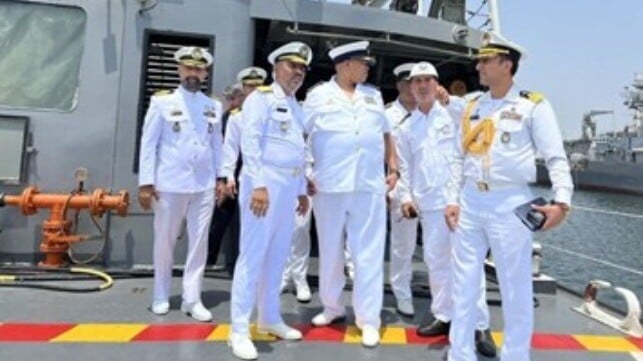Iranian Navy Stokes a Political Problem in South Africa

The Iranian Navy, and its potential participation in a South African naval exercise, is being used as a tool to prosecute political objectives, both in South Africa and in Iran.
Iran has lost many friends and allies, along with regional influence, since the conflict in Gaza initiated a roll-back of its Axis of Resistance. Hezbollah in Lebanon and Assad in Syria have been lost, Iranian influence curtailed in Iraq, and Armenia’s peace negotiations with Azerbaijan have come about at the expense of Iran. Even the confidence of support from Russia and China has waned, as both place greater emphasis on achieving political objectives with the United States than supporting Iran with its regional ambitions.
So with some enthusiasm, Iran has grabbed the hand of friendship offered by South Africa, which is seeking to attract participation in a joint naval exercise to be held under South African leadership. Of the BRICS nations invited to attend, representatives from South Africa, Russia, China, Ethiopia, Indonesia, and Iran attended a preparatory meeting in Cape Town on the Mosi-3 naval exercise in June. The exercise was scheduled to be conducted off the Western Cape in November, and would have followed on from the Exercise Mosi-1 held in November 2019 and Exercise Mosi-2 held in March 2023. The exercise has since been postponed, when South Africa realized that it would clash with the G20 conference scheduled to be held in South Africa at the same time. That clash was sufficient to prompt President Trump to cancel his attendance.
In the meantime, Iran had followed up the fleeting opportunity to participate in Exercise Mosi-3 by inviting the South African Chief of Staff General Rudzani Maphwanya to visit Tehran. Maphwanya was received by his Iranian opposite number Major-General Seyyed Abdolrahim Mousavi on August 12, his visit to Tehran not apparently approved beforehand by South African President Cyril Ramaphosa. At the meeting, Maphwanya said South Africa shared ‘common goals’ with the ‘peace-loving nation of Iran’, condemned US aggression and said it supported ‘Tehran’s outreach to Africa’.
This may have thrilled the Iranians, but not President Ramaphosa - who objected to this unprecedented freelancing by the South African military into the political space, especially at a time when South Africa is seeking to improved relations with the United States. But rather than firing General Maphwanya, the President’s subsequent criticism of him was considered by many in South Africa to be muted, insufficient to unwind the precedent set by General Maphwanya’s visit.

that matters most
Get the latest maritime news delivered to your inbox daily.
The head of South Africa’s Navy, Admiral Monde Lobese, visited the Iranian naval base in Bandar Abbas in August last year. In June 2021, IRINS Makran (K441) and the frigate IRINS Sahand (F74) made a port call in Cape Town, en route to Russia, and IRINS Makran returned in May 2023 with the frigate IRINS Dena (F75) on the last leg of the 86th Flotilla’s round the world cruise.
It remains to be seen when Exercise Mosi-3 will be rescheduled. But if it comes to pass, it will be a naval exercise with greater than normal political significance.
